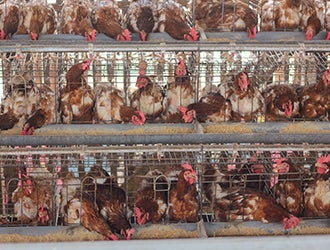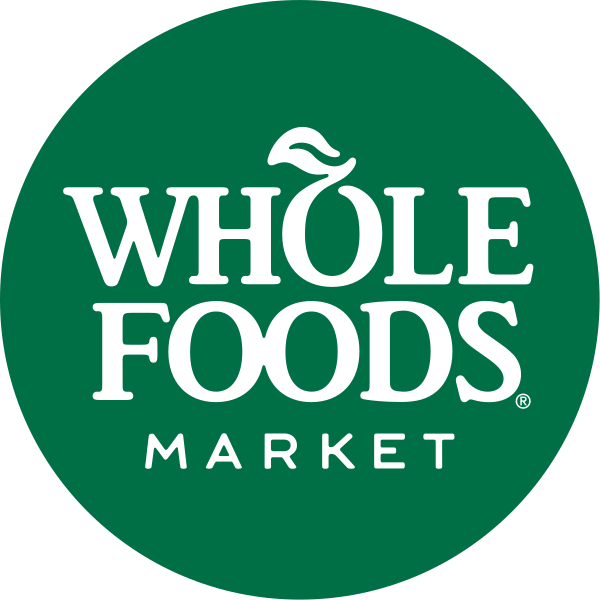Taking stock of grocery stores’ commitment to farm animal welfare
The 2024 Supermarket Scorecard has been released! See the updated scores.
The inaugural ASPCA Supermarket Scorecard (2023) evaluates the 20 largest grocery store chains in the U.S. on their policies to address critical welfare issues for:
- Chickens raised for meat (also known as broiler chickens)
- Egg-laying hens
- Pregnant pigs
Building on our Shop With Your Heart® program, which highlights welfare-certified brands and products, the ASPCA Supermarket Scorecard empowers Americans with the knowledge they need to shop in harmony with their values.
Supermarket Scores
Use the tabs below to see your supermarket's final grade, as well as how they scored on addressing critical animal welfare issues for broiler chickens, egg-laying hens and pregnant pigs. Hover or tap the chart to see the breakdown of individual scores.
Each animal score is a combination of the supermarket’s commitment to farm animal welfare as determined by: 1) the strength of its published policies, and 2) its self-reported progress toward the implementation of those policies. More information can be found in the Methodology section.
The Issues
Our first scorecard focuses on three policies that address some of the most concerning practices employed on factory farms. Factory farms are large-scale, industrial operations where tens of thousands of animals are crowded together in giant warehouses. Supermarkets must work actively to eliminate extreme sources of animal suffering, like cage confinement and using breeds predisposed to injury and illness, from their supply chains.
While banning the worst factory farming practices is an important first step, many farms go beyond this baseline to provide animals with holistically better environments. See our Note to Supermarket Executives to learn how subsequent versions of this scorecard will assess verified higher-welfare offerings.

Conventional chickens are bred to grow so rapidly and disproportionately that even at a young age they have trouble walking and are at risk for heart failure. The Better Chicken Commitment requires that chicken farms use healthier, more robust breeds, improved housing conditions (including more space, better light, cleaner litter and enrichment) and more humane slaughter practices.

Most egg-laying hens in the U.S. are raised in stacked battery cages, each of which provides less floor space per bird than a sheet of printer paper. Cage-free policies pledge to eliminate battery cages so birds have room to move throughout the barn and perform basic natural behaviors.

Most breeding pigs spend their pregnancies confined to a gestation crate, which is so small that they cannot turn around or move more than one step forward or backward. Gestation crate policies pledge to eliminate these enclosures so that pregnant pigs have room to move, stretch their limbs and interact with others.
Key Findings
It is encouraging that many major grocery store chains have posted public commitments to eliminate at least some forms of intensive confinement of animals raised on farms. Still, despite growing public rejection of such confinement and other intensive practices, almost all of the egg, chicken and pork products on American supermarket shelves come from factory farms that restrict animals’ movement. Many retail chains have stalled in fulfilling their promises, while others have not even acknowledged the widespread problem of farm animal cruelty in the food system. This is affecting billions of animals, farmers who have invested in higher-welfare practices and consumers who are hungry for more humane options.
Despite the need for accelerated progress, there is good news for both farm animals and welfare-conscious consumers, as well as real opportunities for many supermarkets to improve.

 Five supermarkets scored zero points, having no animal welfare policies on any of these three critical issues. Despite broiler chickens making up the majority of animals raised and killed in the U.S., these animals are the least covered by supermarket policies. The most progress has been made for egg-laying hens, in terms of both cage-free egg policies and progress reporting. While gestation crates have been banned or are soon to be banned in several states, supermarkets are not taking decisive action to end the inhumane confinement of pregnant pigs.
Five supermarkets scored zero points, having no animal welfare policies on any of these three critical issues. Despite broiler chickens making up the majority of animals raised and killed in the U.S., these animals are the least covered by supermarket policies. The most progress has been made for egg-laying hens, in terms of both cage-free egg policies and progress reporting. While gestation crates have been banned or are soon to be banned in several states, supermarkets are not taking decisive action to end the inhumane confinement of pregnant pigs.The Opportunity
Supermarkets have immense power and influence.
USDA data shows that Americans purchase two-thirds of their calories from large grocery store chains, making supermarkets the arbiter of how Americans eat.
According to Business Insider data, the top four supermarket chains control 44% of the market. With the proposed merger between Kroger and Albertsons, this consolidation will increase.
According to ASPCA survey data, two-thirds of consumers have no idea how much of the meat, eggs and dairy they buy comes from factory farms, where large numbers of farm animals are kept in intensive confinement.
A 2023 survey shows that shoppers are becoming increasingly concerned with farm animal welfare issues and are looking to supermarkets to use their power and influence for good.
91% of shoppers agree that food brands should address both the environment and animal welfare in their sustainability strategies.
69% of consumers want more information about supermarkets' progress toward stocking more humanely produced products.
64% of shoppers would switch supermarkets if they learned that theirs did not offer more humane alternatives to factory-farmed food.
Methodology
One of the ways to get animal welfare on the corporate agenda is for supermarkets to make a public commitment to phase out inhumane practices. Policies are more powerful in spurring positive change when they are publicly available, specific and time-bound. Publicly reporting progress toward achieving these goals demonstrates effort and accountability to both shoppers and the farms in their supply chain.
The 2023 ASPCA Supermarket Scorecard involved the development of an innovative scoring methodology to assess the robustness of animal welfare policy commitments and the degree and strength of public progress reporting against these commitments.
Read the full methodology here.A Note to Supermarket Executives
In future scorecards, the ASPCA will reevaluate how top supermarkets improve these three policies and likely expand to include:
- More grocery chains
- Additional critical welfare issues impacting other animals raised for food
- Stores’ assortments of higher-welfare products, including plant-based alternatives
Animal welfare policies and progress represent a baseline effort to acknowledge and address some of the most concerning practices employed on factory farms today, but many farmers are going well beyond that to provide animals with holistically better environments, from enriched indoor environments to free-range systems and pasture-based farming, and are adhering to robust independent welfare certifications. That is why future scorecards will evaluate stores’ offerings of welfare-certified products, starting with supermarkets' store brands (also known as private labels), over which they exhibit even greater control, as well as store brands’ plant-based products. Store brands are increasingly important [PDF] to largescale supermarkets, with these products accounting for 20% of all retail food sales and growing four times as fast as national brands.
As our 2023 survey data shows, in addition to being a moral imperative, addressing farm animals’ suffering represents a business opportunity for supermarkets. Consumers are looking for higher-welfare products and want more information about supermarkets' plans to eliminate practices in their supply chains that they find unacceptable. A lack of transparency and commitment around animals’ welfare is fast becoming a liability: the majority of shoppers said they would switch supermarkets if they learned that theirs did not offer more humane alternatives to factory-farmed food products, and a staggering 91% of Americans expect sustainability efforts to include animal welfare.
Ultimately, this annual resource will evolve to assess supermarkets’ dedication to farm animal welfare, and to meet consumers’ growing demand for products that align with their deep concern for animals. We are committed to working with the supermarket sector to help companies seize on this powerful opportunity—and unique responsibility—to build a more compassionate food system.
